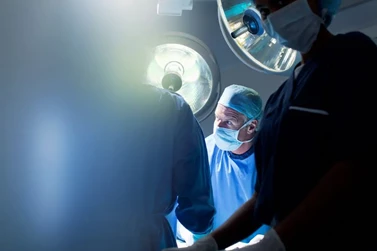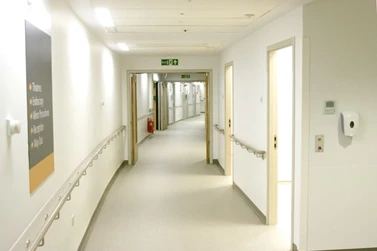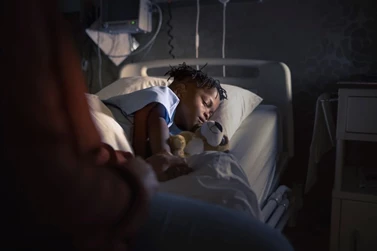Medical Negligence During Childbirth
The birth of a child is meant to be one of the happiest days of a parent’s life - but childbirth can also be dangerous, and there are many things that can go wrong for both mother and baby.
If you have received poor care during childbirth, you may be able to make a medical negligence claim.
Our clinical negligence team has a strong track-record of securing compensation for families who have suffered as a result of childbirth negligence.
We can help you claim for childbirth injuries to the mother, such as childbirth tears and c-section errors. Our lawyers can also support you with claims for birth injuries suffered by your child as a result of negligent treatment.
Contact us today for free, no-obligation legal advice about your case. We can tell you if you have a claim, provide an estimate of how much compensation you could receive, and help you start your claim on a no win, no fee basis.
Our Childbirth Negligence Solicitors
If you’re ready to talk about your case, one of our medical negligence lawyers would be happy to help.
Call us on 08000224224Childbirth injuries to mothers
If something goes wrong during childbirth, it can seriously affect a mother’s health and wellbeing, as well as her ability to care for her newborn child.
If you have been injured while giving birth because of negligent medical care, you may be entitled to compensation.
Our solicitors can help you claim damages for negligent treatment including:
- Misdiagnosis of pre-natal conditions
- Childbirth tears
- C-section errors and other surgical mistakes.
Childbirth injuries to babies
We are often approached by families in the devastating circumstance where they have either lost a child at birth, or their child has experienced a significant injury as a result of something going wrong during delivery.
In these extreme cases, complications during childbirth can lead to a child developing life-altering conditions. For example, a lack of oxygen can lead to brain damage or cerebral palsy.
If your child has been injured as a result of medical negligence, we have extensive experience of bringing successful birth injury claims on behalf of our clients. We also have a Legal Aid franchise available for claims where children suffered a brain injury before they were 8 weeks old.
Get in touch with our solicitors to find out more about how we can help.
Types of childbirth negligence
Missed diagnosis during pregnancy
There are a number of conditions that can affect pregnant women that require urgent medical treatment. If the symptoms are missed or misdiagnosed, this can lead to serious health problems for the mother and child, including:
- Pre-eclampsia and eclampsia
- Gestational diabetes
- Maternal sepsis
- Placental abruption.
Childbirth tears
Childbirth tears, including perineal tears, can sometimes occur as a result of negligent treatment by medical professionals. For example, tears can be caused by negligent use of forceps during delivery.
Another example is episiotomies, which is when the vaginal opening is cut wider to assist delivery. An episiotomy can prevent severe tearing, so failure to perform one in time can lead to the mother experiencing an avoidable tear injury. On the other hand, a negligently performed episiotomy can actually worsen childbirth tearing.
The treatment of childbirth tears can also be negligent. If tears are not stitched, sutured or treated properly, this can delay the healing process and cause unnecessary pain and suffering to the new mother.
Caesarean section (c-section) negligence
Mothers can also suffer from medical mistakes related to caesarean sections, for example:
- Unnecessary delays before a c-section is performed risks the health of mother and child. If a caesarean delivery is required, it is vital that it is performed promptly. Medical negligence can occur when doctors, midwives or nurses miss the signs that a caesarean is needed
- Surgical errors during a c-section procedure can cause complications and hinder the mother’s recovery process.
Frequently asked questions about medical negligence in childbirth
A tear happens when the baby stretches the vagina during birth to the point at which the skin of the perineum strains and then tears. A tear can happen if:
- A baby weighs over 4kg
- The mother has had an induction
- The mother has had an epidural
- The labour is long in the second stage
- The baby is in a occipitoposterior position
- The baby suffers a shoulder dystocia
- The mother has to have a midline episiotomy
- Forceps were used during the delivery.
Childbirth tears can have physical and psychological problems if they aren’t treated properly. Severe tears can be extremely painful and women can suffer from incontinence of flatus, stool leakage and excessive pain when sitting or lying down. These symptoms can last for months or even have a permanent effect on some women.
Every tear should be assessed correctly post-delivery to determine the severity of the tear and if the tear involves the anal sphincter.
Every tear should be assessed correctly post-delivery to determine the severity of the tear and if the tear involves the anal sphincter.
The Royal College of Obstetricians and Gynaecologists (RCOG) has set out guidelines for the management of third and fourth-degree tears. These state that the tear should be repaired by an appropriately trained obstetrician, women should be given a broad spectrum of antibiotics for five to seven days, and women should be offered physiotherapy and be reviewed six to twelve weeks after the tear occurred. Find out more about what treatment women should receive after a childbirth tear in our guide to childbirth tears.
You can claim on a no win, no fee basis – also known as a conditional fee arrangement. This means you will only have to pay legal fees if your claim is successful, and nothing if it is not successful.
Although most perineal tears heal well and become asymptomatic, some women are not so lucky. If the medical personnel has not taken the necessary steps to prevent tearing during childbirth, and if it does happen and it isn’t recognised and repaired immediately, then you may be entitled to make a maternity negligence claim.
As lawyers, we see many different types of potential medical negligence claims for women who have sustained some form of perineal tear during delivery. It is not the case that any and all tears suffered during childbirth are as a result of negligence.
We often have enquiries from women who have been fearful their whole pregnancy that they are going to have a big baby and feel that they are going to struggle with a vaginal delivery. While having a big baby does carry with it increased risk of tearing, or other complications which may result in tearing, the risk of having a big baby is not usually enough of a reason to offer a woman a caesarean section.
At the end of 2011, NICE brought out guidance on the provision of a caesarean section. Within the guidance there is a section which refers to the maternal right to choose in certain situations where specific criteria are met. If women have their request for a caesarean section refused and then find themselves sustaining a significant perineal injury which a cesearean could have avoided, it may be that women in this situation will be able to pursue a successful claim for medical negligence.
It is very rarely possible to make a claim for a situation where the baby has suffered a shoulder dystocia, which is where the baby’s head is delivered but their shoulders get stuck above the pelvis. This situation is almost entirely unpredictable and unavoidable, as well as being quite unusual. This is a very dangerous situation for both mother and baby, where delivering a live baby is the highest priority and it is very unlikely that you could bring a successful claim for suffering a tear in such circumstances.
The most common basis for a childbirth tear claim comes after the delivery. Repairs should be carried out in a calm and controlled setting and, as such, if carried out in a competent manner by appropriately trained and practiced obstetricians there should be no longer term complications.
It is appropriate for a first or second-degree tear to be repaired by an appropriately trained and qualified medical personnel in the delivery room.
However, if there is a risk that a woman has sustained a third or fourth-degree tear, then the repair should be carried out in theatre, in sterile surroundings and by an appropriately trained obstetrician. In these circumstances, the tear should be carefully assessed and that assessment should be documented. The repair procedure should be done in accordance with the guidance in relation to the type of suture and appropriate materials and, again, this should be fully documented. The mother should then be given antibiotics and laxatives and should have her six-week post-natal check with an obstetrician.
If you have been diagnosed with a third or fourth-degree tear and you did not receive this level of treatment - and you are still suffering from problems - then you may have a claim for medical negligence during childbirth.
You may also be able to make a claim if you weren’t given an episiotomy where there is likelihood of a serious tear. If an episiotomy wasn’t used correctly to prevent a tear, you may be able to claim for negligence if you are allowed to tear, or if the extent of the tear was not correctly dealt with or spotted after birth.
The other area where a perineal tear may be the cause of a pregnancy injury claim is during a subsequent pregnancy. Previous perineal tears should be taken into account when considering the method of delivery for subsequent children. If a woman is not counselled appropriately or is denied an option such as a caesarean section then, again, there is a possibility that if she goes on to sustain a further perineal injury as a result, she may have a claim for medical negligence.
Thompsons Solicitors has acted for clients who have experienced a whole range of symptoms after a childbirth tear. We have had clients who have experienced complete breakdowns of their perineum, leading to urinary and/or faecal incontinence, and in some cases even ending up with a colostomy to give the area time to heal.
If the negligence happened more than three years ago, you will usually not be able to make a claim for compensation. However, exceptions do apply – such as instances where you could not have reasonably known your symptoms were caused by clinical negligence. Our discrete and compassionate lawyers are experienced in the full range of pregnancy injury claims, and will work with you to establish whether you have a claim for compensation.
At Thompsons, we are highly experienced at securing compensation for medical negligence which resulted in a birth injury to the mother.
We have been named as one of the UK’s best law firms for clinical negligence by the Times for four years in a row.
Unlike many law firms we act only for the injured, never for those who caused the injury or their insurers. That has been a principle of the firm ever since we started over 100 years ago.
If you have experienced injury as a result of negligence during or after childbirth, contact our medical negligence lawyers for free, no-obligation legal advice on making a compensation claim. Call us on 0800 0 224 224 or complete our online claim form.

A Guide To Childbirth Tears
What are childbirth tears? Read our guide to the degrees of childbirth tears and what to do should you suffer a perineal tear during labour.
Find out more
NHS Medical Negligence Compensation Claims
If you have experienced a poor level of care from the NHS that resulted in injury or harm, you may be able to claim medical negligence compensation.
Find out more
Making A Clinical Negligence Claim For A Child
Linda Millband, national practice lead of Thompsons' medical negligence team, explains clinical negligence claims relating to children in this resource.
Find out more






